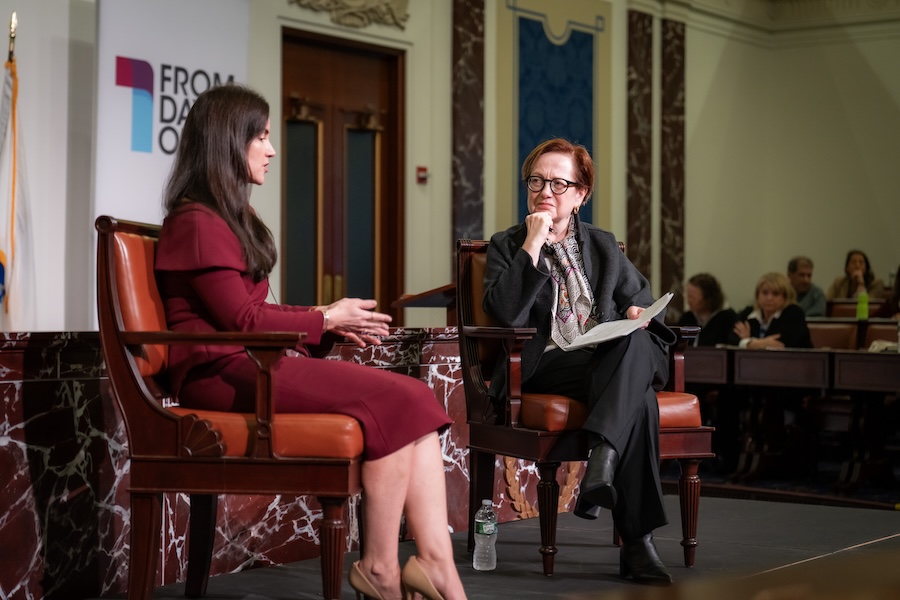The CHRO’s Emerging Role in Leading Digital Transformation


HR used to be about managing people. But now, it’s about shaping the future of organizations. At From Day One’s Boston conference, Lauren Rusckowski Duprey, the chief HR officer at the global pharmaceutical maker Takeda, discussed her experience that shows how CHROs are becoming central to digital transformation and organizational change.
Duprey’s own career shows how dramatically the CHRO role has evolved. She began in management consulting, focused on commercial problems, sales, marketing, new product launches. But she soon realized that even those business challenges actually were people problems. “They were leadership problems, they were organization problems, they were culture problems,” she told session moderator Amy Bernstein, editor-in-chief of Harvard Business Review.
That insight changed her entire career path. Duprey joined Takeda about six years ago as head of HR for the U.S., eventually becoming CHRO. “If you asked me, 15 even 20 years ago, if I thought I would have a career in HR, I probably would have asked you, what is HR?” she said. “But I think that’s the neat thing about careers and all of our journeys—they take you in unexpected places.”
Leading Through Crisis, and Learning From It
When Duprey started at Takeda, the company was navigating a major integration following its acquisition of Shire. Not long after, Covid hit. She volunteered to lead the company’s U.S. crisis committee, not realizing how all-consuming it would become.
“It was a great sort of leadership lesson in staying humble, listening to others, to experts, not panicking, keeping composure, but taking things very seriously,” she said. “And communicating and building trust with employees and everyone else around us.”

For Duprey, the heart of the CHRO role is problem-solving. Whether navigating a crisis, a transformation, or emerging technologies, she sees her role as helping the organization decide whether it was a challenge or an opportunity. “In most cases, it’s a bit of both,” she said.
Right now, the problem to solve is AI. “It’s this amazing opportunity, and it’s really neat to see what it can do,” she said. “But it's a challenge too, and it’s a people challenge.”
The Role of Tech in Leadership
Bernstein asked Duprey what new skills she’s relying on today that she didn’t need seven years ago. Her answer came quickly: technology.
“I don’t consider myself to be like a great technologist,” she said. “I hang on to my version of the iPhone for way longer than is relevant.” But in today’s landscape, you’ve got to know the tech, she says.
That doesn’t mean as an HR leader you need to become an engineer. “You don’t have to know the ins and outs of it.” However, you should know how to relate to it. “You must be able to shape it, help to frame it, and help to move others along through it.”
One example is Takeda’s AI-powered talent marketplace. A few years ago, her team proposed it. She wasn’t entirely sure what that meant at the time, so the team explained it, pushed for it, and she chose to trust them, even if she didn’t fully understand it at first. “And I’m so glad we did.”
For Duprey, leading digital transformation is less about technical mastery and more about staying curious, surrounding herself with experts, and being willing to experiment. “If you don't have ChatGPT on your phone for personal use, you should do that, and then play with it.”
A New Role: Chief Transformation Officer
Recently, Duprey gained an additional title: Chief Transformation Officer. This role signals a major shift in how organizations see HR.
At Takeda, the new title coincides with a leadership transition and an opportunity to rethink the company’s future. “It’s multifaceted,” she said. “There is a very large technology component to it. There’s an enormous cultural component to it.”
The new role has also strengthened her position inside the C-suite. “This, just even in the couple of months, has positioned me much more squarely as part of the team,” she said. Some executive colleagues now explicitly tell her, “I’m talking to you right now, not as CHRO, but as this other role.”
Looking Ahead: HR as a Strategic Partner
Not all C-suite colleagues respond to change in the same way. Some are enthusiastic; others are looking at their watch. Duprey approaches this with patience and persistence. Transformation, she says, requires seeing the long game whether one year, five years, or ten.
“You will have people that doubt it,” she said. “You’ll have people that raise questions that you don’t know the answer to. And that’s okay. Just keep getting that feedback and keep moving through.”
Ultimately, Duprey believes the CHRO is no longer a supporting role, instead it’s central to the organization’s future. As technology accelerates and workforces evolve, HR is uniquely positioned to lead with perspective, empathy, and strategic clarity.
“Technology is forcing it,” she said. “Every company is going to have to rethink and look at how they’re operating, how roles are really structured.” And HR, she says, should be helping them do exactly that. In the years ahead, the CHRO will be one of the most influential voices shaping how companies adapt, compete, and grow.
Carrie Snider is a Phoenix-based journalist and marketing copywriter.
(Photos by Josh Larson for From Day One)
The From Day One Newsletter is a monthly roundup of articles, features, and editorials on innovative ways for companies to forge stronger relationships with their employees, customers, and communities.